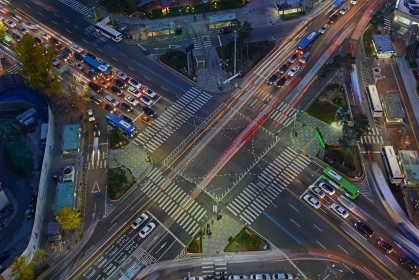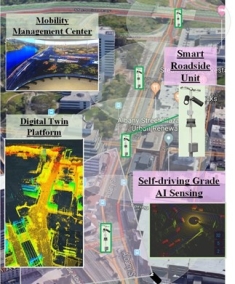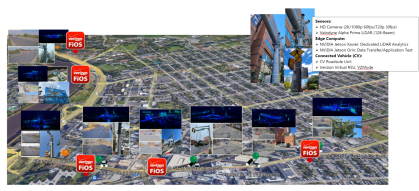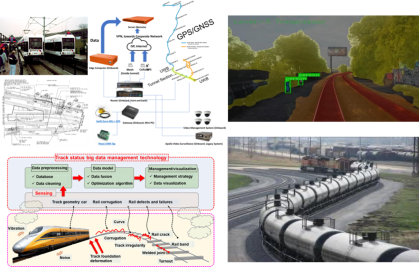Civil and Environmental Engineering Research Area
Transportation Engineering

Transportation engineering is a discipline devoted to the planning, design, construction, and management of transportation systems and facilities to facilitate efficient transit of people and goods. It employs advanced technologies and methodologies to accomplish key objectives such as enhancing mobility, improving safety, minimizing environmental impact, promoting resilience, and ensuring equity in transportation access. This discipline strategically employs innovative technologies and methodologies to fulfill paramount objectives such as improving mobility, enhancing safety, reducing environmental impact, fostering resilience, and guaranteeing equitable access to transportation.

It encompasses a diverse range of transportation modes including private vehicles like cars and motorcycles, transit vehicles such as buses and trams, non-motorized modes like bicycles and pedestrians, micro-mobility devices including e-scooters and hoverboards, and railroads and maritime, each necessitating distinct considerations and tailored approaches. In addition to tasks like traffic signal design, highway planning, and policy development, transportation engineers aim to resolve a variety of challenges by creating sustainable, resilient, and inclusive transportation networks.
The incorporation of cutting-edge solutions such as Intelligent Transportation Systems (ITS), and Geographic Information Systems (GIS), along with the recent development of Electric, Connected and Automated Vehicles (ECAVs) and Ride-sharing vehicles, have significantly propelled the field forward to address modern transportation challenges. The role of transportation engineering is crucial as it contributes to the development of advanced transport networks that can meet evolving societal demands, promote economic growth, and elevate the quality of life. Transportation engineering consists of the following main research thrusts.
Associated Faculty: Jie Gong, Peter Jin, Xiang Liu, Hao Wang
Research Thrusts
Smart Mobility Research
Faculty: Peter Jin, Xiang Liu, Hao Wang, Jie Gong
This research thrust in smart mobility leverages advanced sensor technologies, Artificial Intelligence, Advanced Computing, Wireless Communication technologies, Digital Twin, and Big Data analytics to pioneer next-generation mobility systems with goals centered on enhancing efficiency, safety, environmental sustainability, equity, and resilience. It melds the intersections between conventional traffic flow theories, traffic operations and control, and intelligent transportation system technologies with prevailing innovations in Artificial Intelligence, Connected and Automated Vehicles, Digital Twin, Smart City Initiatives, and more, aiming to unlock the full potential of transportation systems and services.

The thrust explores the design, planning, control, operation, and management of ridesharing, electric, connected, and automated vehicles, investigating optimal strategies for their incorporation and management in mixed traffic environments alongside conventional, human-driven, combustion engine vehicles. Additionally, it concentrates on fostering a safe, efficient, and environmentally friendly environment conducive to the development of future zero-emission and autonomous transit systems, micro-mobility solutions, and protective frameworks for pedestrians, bicyclists, and other vulnerable road users. Researchers engaged in this smart mobility thrust will have privileged access to the DataCity Smart Mobility Testing Ground—a 2.4-mile open-road living laboratory outfitted with 14 intelligent roadside locations and equipped with autonomous-grade sensing, computing, and communication technologies.
Intelligent Rail and Transit Systems
Faculty: Xiang Liu, Peter Jin, Hao Wang, Jie Gong
Freight railroads transport more than 40% of the gross ton-miles of cargo in the United States, while passenger rail and public transit systems offer cost-effective and environmentally sustainable modes of travel to millions of passengers annually. Rutgers University hosts the most comprehensive rail-centric research program in the New York metropolitan area. In this research thrust, we explore the cutting-edge application of advanced sensor technology, data analytics, wireless communications, and automation technologies to address a wide array of critical subjects in the rail and transit industry.

The research domains encompass rail and transit infrastructure data informatics and asset management, the enhancement of grade crossing safety, the prevention of trespassing incidents, the implementation of rail safety measures, the advancement of train control technology, energy materials transportation, rail operational planning and simulation, the integration of clean and renewable energy sources, resiliency against natural or man-made hazards, and the development of innovative methods for the design, operation, and maintenance of next-generation intelligent rail and transit systems.
As one of the nation's preeminent rail programs, our faculty collaborates extensively with federal and state government agencies, major freight and commuter railroads, public transit authorities, and private-sector partners. Furthermore, Rutgers CEE offers a distinctive rail education curriculum to nurture the next generation of professionals, supporting the development of safe, interconnected, intelligent, and efficient rail and transit systems on both a national and global scale.
Sustainable and Resilient Transportation Infrastructure
Faculty: Hao Wang, Xiang Liu, Peter Jin
Transportation infrastructures and systems promote economic and social development but pose challenges to the vision of a sustainable world with greenhouse gas emission. Transportation sector accounts for the largest portion (almost 30%) of total anthropogenic greenhouse gas emissions in the U.S causing climate change and global warming potential. On the other hand, transportation infrastructure needs to be resilient under the impacts of flooding, global warming, sea level rise, and extreme weather events. Electric vehicles provide opportunities for lowering transportation costs, reducing greenhouse gas emissions, and utilizing renewable energy. It is important to build and maintain ubiquitous charging infrastructure for mobility and safety of electric vehicles. Future transportation infrastructures are desired to achieve long-lasting life under climate change impact, reduce carbon footprints, promote circular economy, interface with automated and connected vehicles, and create positive energy pathways. This research thrust will leverage material innovations, computation modeling, life-cycle analysis, and artificial intelligence to provide innovative solutions for developing sustainable and resilient transportation infrastructures and facilities for climate change mitigation and adaptation, such as roadway, railway, airport, pipeline, etc. The research topics include low-carbon and high-performance infrastructure materials, environment-friendly infrastructure design, pavement engineering, infrastructure management system and digital twin, life-cycle assessment, pipeline integrity management system, and transportation electrification.